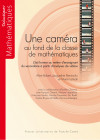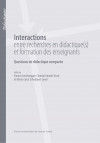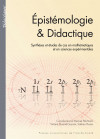
- Summary
-
Teachers make decisions every day about the content and management of their classes. At the same time, they are constrained by the curriculum, their environment, the world and their own resources.
This book invites the reader to share tools that can clarify these choices. The authors describe how their analyses of classroom situations and their expertise in mathematics didactics inform their training activities, which are based on classroom practice. Information on the state of teaching in France and possible contributions from neuroscience complete the didactic enlightenment. - Contents
-
Présentation de l’ouvrage
PARTIE 1
Chapitre 1 : La démarche globale adoptée dans ce livre sur les formations professionnelles des enseignants de mathématiques du secondaire
Chapitre 2 : L'étude des déroulements des cours (moments d’exposition des connaissances) – l’outil « proximités »
Chapitre 3 : Un cours sur l’introduction du théorème de Thalès en troisième REP : le travail de l’enseignant en classe.
Chapitre 4 : Formations aux technologies numériques – De l’analyse des pratiques à leur développement
Chapitre 5 : Évaluation des apprentissages des élèves en mathématiques : un levier pour la formation des formateurs et des enseignants
Chapitre 6 : Actions de formation concernant le rôle du langage verbal dans l’apprentissage et l’enseignement des mathématiques
Chapitre 7 : Exemples tirés de pratiques de formation initiale s’inscrivant dans la démarche générale commune d’une formation « à l’envers »
Chapitre 8 : Simulateurs et ingénieries de formation
PARTIE 2 - COMPLÉMENTS
Chapitre 9 : Des données quantitatives à partir d’évaluations à grande échelle - des réformes du lycée et des formations – des changements dans le métier
Chapitre 10 : Aux sources de la ZPD (externe – interne) et de la théorie de l’activité, quelques pistes
Chapitre 11 : Des neurosciences à l’enseignement des mathématiques - premiers constats, premières interrogations.
Conclusion
Bibliographie
Sommaire
Index
Présentation des autrices et auteurs
- Author (s)
-
Julie HOROKS (edit. coord.)Julie Horoks is a professor of mathematics didactics at the Université Paris Est - Créteil, where she teaches initial training for school teachers in mathematics and vocational high school teachers in mathematics and science. She also provides in-service training and teacher training on the subject of assessment.Aline ROBERT (edit. coord.)Aline Robert is a researcher in mathematics didactics, honorary professor at the University of Cergy, and associated with the André Revuz Didactics Laboratory. Her work and the work she has supervised have focused on the teaching of mathematics at university, the practices of mathematics teachers and their professional training for secondary education.Maha ABBOUD (with the coll. of)Maha Abboud is a professor of mathematics didactics and currently director of the André Revuz Didactics Laboratory. She has been a trainer at INSPE for some thirty years, where she is involved in the initial and in-service training of school teachers and secondary school mathematics teachers. She is also involved in masters courses in teacher training, where she teaches courses on the study of teaching practices.Aurélie CHESNAIS (with the coll. of)Aurélie Chesnais is a professor of mathematics didactics in the Faculty of Education at the University of Montpellier, attached to the Interdisciplinary Research Laboratory in Didactics, Education and Training (LIRDEF). She has been a teacher trainer (primary and secondary level, initial and in-service training) for the past fifteen years, and also teaches masters courses in teacher training and research into the didactics of science. She has also led an IREM group for the past ten years.Lalina COULANGE (with the coll. of)Lalina Coulange is a professor of mathematics didactics and a member of the Épistémologie et Didactiques Des Disciplines laboratory (LaB-E3D, EA 7441) at the University of Bordeaux. She has been a teacher trainer (primary and secondary levels, initial and in-service training, training of trainers) for around twenty years.The five main authors are professors of mathematics didactics and INSPE trainers (for secondary and primary schools). Their research focuses on the practices of mathematics teachers, with specific emphasis on the integration of ICT, language, assessment, etc.
- Readership
-
Secondary school mathematics teachers or trainers.
- downloadable items
- Online
- Support (s)
-
LAB – E3D, Bordeaux Fédération de recherche et d’éducation, Montpellier Laboratoire de Didactique André Revuz, Paris












